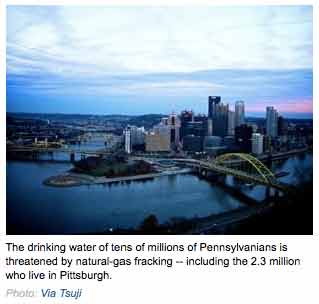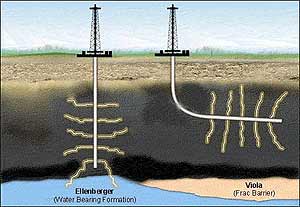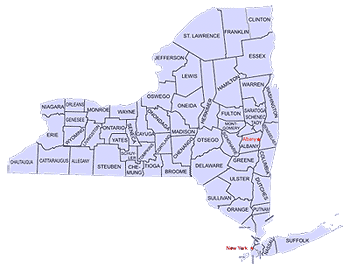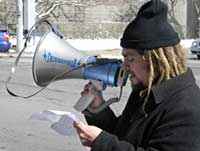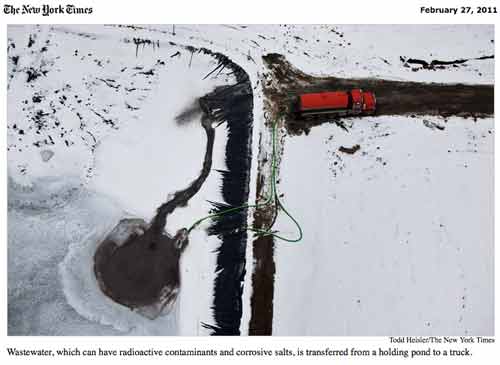Press
Saying the cost of natural-gas development could outweigh the benefits, Pennsylvania's two highest-ranking environmental officials built a case Monday for imposing more taxes and regulation on Marcellus Shale exploration.
John Hanger, secretary of the Department of Environmental Protection, told a gas-policy conference here that it was time for the state legislature to impose a production tax on gas operators - who, he said, "are almost laughing at their good fortune at not having to pay a severance tax."
..."Quite frankly, the citizens of this state are being played for chumps," Quigley said.
DEP's Hanger ridiculed the state's 1984 law requiring gas operators to set aside a "pitiful" $2,500 insurance bond to pay for plugging an abandoned well. It costs the state about $10,000 to seal off an orphaned well.

Residents of Pittsburgh -- as well as potentially tens of millions of other everyday citizens in the Northeast corridor who rely on their taps to deliver safe water -- are consuming unknown and potentially dangerous amounts of radium in every glass of water. That's the buried lede in the Sunday New York Times' massive exposé on fracking, the relatively new process for extracting natural gas from the massive shale formation that stretches from Virginia to New York state.
"...Walter Hang, president of Ithaca-based Toxics Targeting Inc., has been working with Pulteney residents on the wastewater issue. Even with Chesapeake's decision, the Pulteney saga proves this is a problem that has not been adequately addressed by DEC and others, Hang said.
-----"That was obviously a ridiculously bad location to put a deep well injection facility," he said. "Why would you ship that water hundreds of miles to the middle of nowhere and move it to within a mile of this historic jewel of a Finger Lake?""
State Assemblywoman Barbara Lifton wants to slow it down. Sen. Thomas Libous is for speeding it up. Assemblywoman Donna Lupardo is torn between extremes.
Elected officials taking a position on Marcellus Shale development are facing strident demands from stakeholders who could become rich, go broke or possibly abandon hope, depending on Albany's response...
...Deborah Goldberg, an attorney with Earthjustice, an environmental law firm, said the final SGEIS must include substantial changes to account for the cumulative effect of drilling thousands and perhaps tens of thousands of Marcellus wells in New York. If not, the firm will help spearhead a legal challenge, most likely in state Supreme Court in Albany.
That would involve filing an Article 78 Proceeding challenging the DEC's adherence to the State Environmental Quality Review Act.
[At the Cornell 2011 Energy Conference]...Ithaca attorney Helen Slottje, from the Community Environmental Defense Council, addressed the nature of property rights.

Helen Slottje
“People often say, ‘It’s my property and I can do anything I want to,’” she said, adding that there is an overarching understanding of public welfare. In addition, property ownership does not grant a person the right to use his property in a manner that interferes with another’s use of his land.
“Each landowner has the right to quiet enjoyment of his property,” Slottje said. And the rights property owners have over activities conducted on their land change with time.
“A very fundamental property right is the right to exclude,” Slottje said. But New York law allows compulsory integration: the pooling of unleased landowners into drilling units when 60 percent of the land in a unit is leased.
When drilling into conventional reservoirs, where gas and oil flow from unleased land to the well, compulsory integration makes sense. But in shale, drillers must break the rock to release gas and that, said Slottje, involves a trespass.
This diagram, from Petrocasa, explains the widely held gas industry view, "Horizontal drilling also has less impact on the environment. With horizontal drilling, it's possible to extract gas from property adjacent to the well. That means that natural gas can be removed from under property without being on the surface of the land." (Neil Zusman 2011-04-20). For property owners who don't lease, how is this a good thing?
“When you are integrated, you are left with no right to exclude,” Slottje said. “You are left with toxic compounds beneath your land and you are not even compensated at market value.” [At this time integrated landowners are not paid for use of the land and receive the lowest possible royalty, 12.5 percent.]
Slottje warned municipal officials to avoid getting trapped into thinking they have to provide road use agreements. In a 1969 case, the courts found that a corporation’s claim to the right to profit was not greater than the residents’ right to not be impacted. What that means, she explained, is that no corporation has the right to use local residential roads for high-impact industrial traffic. New York law implies that communities can say “no” to heavy trucks, preserving residential roads for local use.
The biggest problem Slottje sees facing municipalities is the increased erosion of enforcement of environmental regulations. “So we’re swinging back to protecting the environment through property rights and home rule,” she said.
See: Cornell 2011 Energy Conference (New!)
See: Spectra Energy Watch
See: State Decision Blocks Drilling for Gas in Catskills
See: There’s Gas in Those Hills
See: Cornell Cooperative Extension (CCE): Landowner Information
See: Proposed gas drilling ban in city wins friends, foes such as Tom Ridge
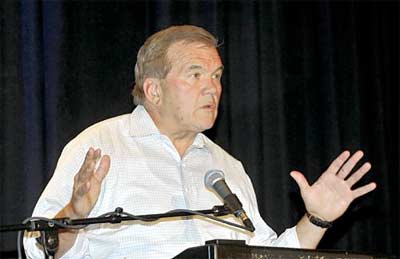
Diametrically opposed viewpoints on the Marcellus Shale boom competed for attention Tuesday with Pittsburgh City Councilman Doug Shields seeking a citywide ban on natural gas drilling and former Gov. Tom Ridge hailing the industry's "transformative opportunity" for Pennsylvania.
Despite questions about the legality of a ban, Mr. Shields unveiled a bill that would prohibit gas extraction anywhere in the city, even if drilling companies have already acquired leases from property owners. Speaking at a morning news conference at the City-County Building, Mr. Shields said drilling hearkened a return to Pittsburgh's polluted industrial past...
Last month, Mr. Ridge and his two consulting firms received a one-year, $900,000 contract to serve as strategic advisers to the Marcellus Shale Coalition, a Cecil-based trade group. However, the former two-term governor said he was approaching the job with the interests of his former constituents in mind...
...Mr. Shields described drillers as "quick-buck artists"; criticized their "paid mouthpieces," including Mr. Ridge; and said the city wouldn't be treated like a "colony" of a state government that puts the drilling industry's interests ahead of the people's. He also lashed out at Mayor Luke Ravenstahl, who opposes a citywide ban because of the economic development potential of gas extraction.
"I understand every government is strapped for cash, but that's not a reason to degrade the quality of life in our city and in our neighborhoods," he said.
See: Know Your Enemy | John Cole Cartoons
See: Pa. Governor Apologizes for Tracking Enviro Extremists, but Questions Remain - ProPublica
Protestors outside the Buffalo offices of the Department of Environmental Conservation today called for an executive order by Governor Andrew Cuomo to define fracking fluid as a hazardous waste and ban its treatment by municipal facilities...
Can local facilities adequately treat fracking fluid?
Small local facilities cannot adequately purify fracking fluid because it contains hundreds of chemicals, including known carcinogens, according to Rita Yelda of the Buffalo chapter of Frack Action, which organized the protest.
Yelda says water is also at risk because layoffs at the DEC could compromise the agency’s work to address fracking issues.
...the relatively new drilling method — known as high-volume horizontal hydraulic fracturing, or hydrofracking — carries significant environmental risks.
It involves injecting huge amounts of water, mixed with sand and chemicals, at high pressures to break up rock formations and release the gas.
With hydrofracking, a well can produce over a million gallons of wastewater that is often laced with highly corrosive salts, carcinogens like benzene and radioactive elements like radium, all of which can occur naturally thousands of feet underground. Other carcinogenic materials can be added to the wastewater by the chemicals used in the hydrofracking itself.
While the existence of the toxic wastes has been reported, thousands of internal documents obtained by The New York Times from the Environmental Protection Agency, state regulators and drillers show that the dangers to the environment and health are greater than previously understood.
The documents reveal that the wastewater, which is sometimes hauled to sewage plants not designed to treat it and then discharged into rivers that supply drinking water, contains radioactivity at levels higher than previously known, and far higher than the level that federal regulators say is safe for these treatment plants to handle.
Other documents and interviews show that many E.P.A. scientists are alarmed, warning that the drilling waste is a threat to drinking water in Pennsylvania. Their concern is based partly on a 2009 study, never made public, written by an E.P.A. consultant who concluded that some sewage treatment plants were incapable of removing certain drilling waste contaminants and were probably violating the law.
The Times also found never-reported studies by the E.P.A. and a confidential study by the drilling industry that all concluded that radioactivity in drilling waste cannot be fully diluted in rivers and other waterways.
But the E.P.A. has not intervened...
See: A Life’s Value May Depend on the Agency, but It’s Rising
Walter Hang said this about the NYT report:
"A 2008 drinking water crisis is documented that affected more than 850,000 residents along the Monongahela River near Pittsburgh. When New York imposed its de facto Marcellus Shale horizontal hydrofracturing moratorium, many firms went to drill in Pennsylvania.
Municipal treatment plants were accepting up to 40% of their influent as natural gas drilling wastewater even though they were not equipped to handle that type of waste. So much Total Dissolved Solids (TDS) pollution was discharged in the Monongahela River that the water became unpotable. A 70-mile stretch of the river was impacted."
Hang, Walter. “The New York Times Covers Marcellus Shale Gas Drilling Wastewater/Hold Onto Your Hats.” 2011-02-26 6:42 PM EST: n. pag. E-Mail.
See: Drilling Down | Documents: Natural Gas's Toxic Waste
See: Video: Natural Gas, Polluted Air
See: Interactive Map: Contamination
See: Graphic: Pulling Gas From Rock
Over the past nine months, The Times reviewed more than 30,000 pages of documents obtained through open records requests of state and federal agencies and by visiting various regional offices that oversee drilling in Pennsylvania. Some of the documents were leaked by state or federal officials. Here, the most significant documents are made available with annotations from The Times.
See: Ian Urbina. "Drilling Down Series Index." NYT. Feb. 27, Mar. 2, Mar. 4, 2011.
See also: Freedom of Information in the USA
See also: Do the natural gas industry’s surface water withdrawals pose a health risk?
See also: With Natural Gas Drilling Boom, Pennsylvania Faces an Onslaught of Wastewater
See also: WATER: Gas drilling in huge Appalachia reserve yields foul, briny byproduct - AP
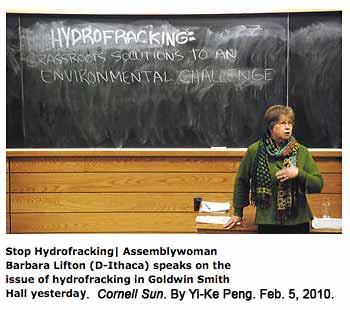
See: Lifton, Barbara. The Assembly. State of New York. "Letter to Governor Cuomo re: Executive Order No. 41 and the Marcellus Shale DRAFT Supplemental Generic Environmental Impact Statement (DRAFT SeEIS), signed by 50 Democratic and Republican representatives." April 13, 2011.
We, the undersigned members of the New York State Legislature, write to thank you for signing a continuation of Executive Order No. 41 as one of your first official acts. That order requires your Department of Environmental Conservation (DEC) to: "analyze comprehensively the environmental impacts associated with high-volume hydraulic fracturing combined with horizontal drilling.." DEC is then required to revise its Marcellus Shale DRAFT SupplementalGeneric Environmental Impact Statement (DRAFT SGEIS) to address widespread criticism of the
original document...
…First, extensive new scientific and technical information has become available since the SGEIS proceeding began nearly three years ago. This includes data gleaned from more than 30,000 pages of documents recently brought to light by the New York Times in a three-part series. We request that you require a public comment period of no less than 30 days to afford interested parties an opportunity to identify sources of new natural gas drilling information that DEC should review in order to revise its DRAFT SGEIS.
...We request that you require the scope of the SeEIS to be expanded to include those issues and all other issues required to fulfill Executive Order No. 41.
The public should be allowed to comment on that matter.
In conclusion, you have repeatedly said you believe horizontai hydrofracturing of Marcellus Shale must only be allowed to proceed in New York State based on "good science." Our requests are entirely consistent with that policy.
See: New York State Assembly Passes Moratorium on Hydrofracking | Governor Vetoes Bill.
Abrahm Lustgarten of ProPublica takes FLYP readers on a journey through Sublette County, Wyoming to take a tour of the wells and hear the voices of residents and experts on the issue.
Anecdotal evidence has been criticized by Gas Industry advocates in the debate over the inadequately funded EPA study. There have been many anecdotal reports of fouled wells and air pollution, unknown risks to chemical exposure and hydrogen sulfide, and methane leaking from gas compressors captured on infrared film.
Cornell professor Robert Howarth has criticized claims that natural gas is "clean-burning". There have also been no studies on the cost benefits of gas drilling.
See: Drilling for Truth and other articles by Lustgarten.
Two top House Republicans and the Senate’s leading global warming skeptic asked the Supreme Court Monday to throw out a lawsuit seeking to force electric utilities to slash greenhouse gas emissions.
House Energy and Commerce Committee Chairman Fred Upton (R-Mich.), his energy lieutenant Rep. Ed Whitfield (R-Ky.) and Sen. James Inhofe (R-Okla.) submitted an amicus brief Monday in the high-profile American Electric Power v. Connecticut case.
According to the American Journalism Review, Politico is a Washington, D.C. based website and newspaper that focuses on Beltway political coverage, started by veteran Washington Post political reporters John Harris and Jim VandeHei started in January 2007.
See: Glenn Greenwald. May 30, 2008. "The right-wing Politico cesspool". Salon.
I once thought that Politico would be a pernicious new addition to our rotted media culture. Instead, it actually provides a valuable service by packing every destructive and corrupt journalistic attribute, in its most vivid form, into one single cesspool.
See: Smackdown: climate science vs. climate economics
See: EPA in the Crosshairs | Mixplex
See: Beware The Green Dragon! | Right Wing Watch
See: Energy & Commerce Committee Investigates Potential Impacts of Hydraulic Fracturing






